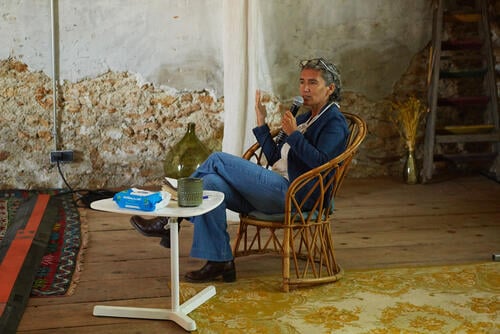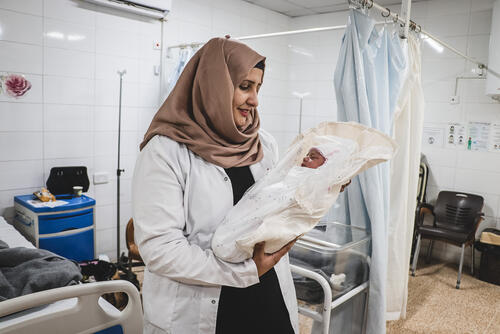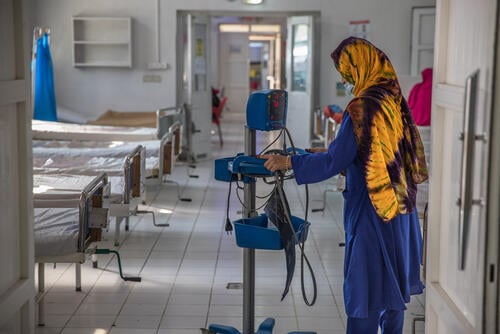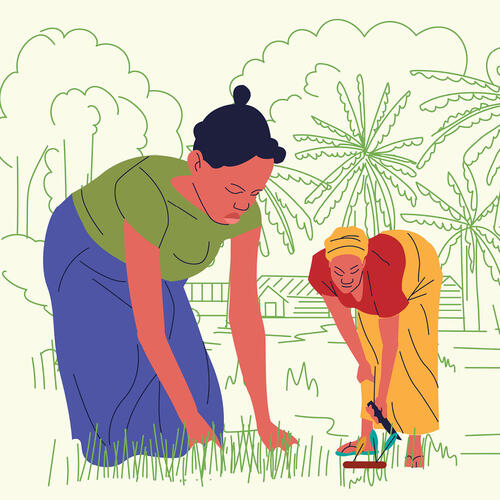Every year, 25 million people worldwide end their pregnancies with unsafe abortions, and 22,800 of them die from the consequences. Despite these grim figures, abortion is often not treated like the essential health care service it is. Here, Médecins Sans Frontières (MSF) midwife Nelly Staderini discusses how MSF has incorporated safe abortion into a standard package of health services.
The following Q&A was translated and adapted from an interview with Staderini by the French podcast Programme B.
Seven million people are hospitalised each year due to complications from unsafe abortion.<p>according to the World Health Organization (WHO)</p> Is it a public health issue to provide access to abortion in humanitarian settings?
Yes, absolutely it’s a public health issue, but that’s not how it’s often portrayed. MSF witnesses the consequences of unsafe abortion. I’ve seen people who have died trying to use sticks, pins, or coat hangers to end their pregnancies. Others ingest soap or laundry detergents; some poison themselves with herbs or with medicines that are not meant to be used in this way.
We work in contexts where it is very common to see these women arrive at consultation rooms, but also in emergency rooms. It has an enormous impact on our staff. Regardless of a person’s reason for ending a pregnancy, the medical consequences of an unsafe abortion are the same.
What is the view on abortion today within MSF? Have you succeeded in educating MSF staff that abortion care must be based on medical ethics and patient needs?
Yes, and it’s absolutely extraordinary. We started working on the issue of safe abortion care more consistently in 2015. Abortion has always happened in MSF projects, but often in a fairly clandestine way. When we did a study in 2016, we interviewed MSF midwives and realised that they were providing abortion care, even if it was not officially formalised in the medical protocols. The requests for abortion were always there and our staff always tried to help when they could. But we wanted to provide this care much more intentionally.
After formalising the medical protocol and policy in 2015, we decided to introduce a one-day workshop of reflection on abortion – it’s called Exploring Values and Attitudes (EVA). It's extremely short, but it has an incredible impact on people’s awareness of their own values, their perspective on abortion, and the consequences their attitudes have on access to care for patients.
We also explore the values of MSF as an organisation, and how your personal values might conflict with the values of MSF. We find that there is a lot of misunderstanding; for example, people think that this is a dangerous activity that can have a detrimental impact on the security of the mission, the staff and the patients.
But providing this type of care can have a very positive impact, especially when the community is involved and engaged in the discussions. In fact, people change enormously – not necessarily from an individual point of view about themselves or what they think about the issue, because that can be a long journey. But they become aware of the important role we all play as a part of MSF and really understand the fact that we – personally or as an organisation – should not add yet another barrier to the ones that women already face when they try to seek this care.
I am still moved by the workshop we organised in Niger, on the border with Nigeria. It was a very hostile and sensitive context with many armed groups, which inevitably made our staff fearful of providing safe abortion care. The day after the workshop, staff members slipped little notes of thanks and appreciation for the workshop into my bag.
It was very touching to see how, in just one day, you can have such an impact on people's awareness. They really see that abortion is an issue that is all around us, that affects our families, that affects our communities. And after the workshop they say, “Let’s not be a barrier to care and let’s open up about this issue.” This personal journey is very touching.
Many people tell us that they didn’t study this at school – the only thing they were told was that it was forbidden. How we talk about the issue in the workshop is, to many people, a breath of fresh air.

Little by little, abortion has found its place among the medical services provided in MSF projects and is now considered a medical necessity. But in the fraught context of war, natural disasters, or epidemics, how do healthcare workers inform patients that abortion is an option?
There are several things we do. First of all, we talk to the community frequently about our activities – this is what we call health promotion. We really work in the heart of the community, and we discuss with people what their health problems and main concerns are and what care we can offer.
Then, we talk to people about the risks of mortality within their community and, therefore, we easily address the issue of unsafe abortion because it is really something that exists in all societies. Sexual and reproductive health is something that is extremely integrated in our care, so, we explain that safe abortion is a service we provide.
But in any case, as soon as we respond to a request of abortion with safe and confidential care, and that person has a positive experience, the information will relay itself through word of mouth.
How do you ensure that confidentiality is guaranteed and that the person who has an abortion is not put at risk?
The question of confidentiality is crucial. It is one of the reasons why women are very interested in self-managed abortion at home when they are offered it. They tell us that it will be easier for them to find the right time, the right place, and the person who will be able to support them if they can self-manage their abortion at home. And sometimes, the hospital environment is not very welcoming for them.
Psychological care is often portrayed as an essential component of safe abortion care; does your experience support this idea?
I think the first thing to do is to deconstruct that narrative. Mental health care is absolutely not necessary – it does not correspond at all to what women are saying, asking for, or needing. I think the idea of compulsory mental health care reassures the provider much more than the patients.
What we see today is that women who generally come to our consultations and wait all day in 40 degrees Celsius in the sun – they know very well what they want, so they are not really bound to ambiguity or hesitation. In general, they come after a long and complicated search for care. So, if we listen to them, we hear them, and we provide the care they are requesting, they don't ask for any psychological support.
The most common emotion people express after an abortion is relief.
Up until how many weeks of pregnancy does MSF provide abortion?
Above all, MSF moves forward with the progress of science, with the recommendations of the World Health Organization, and with protocols that have been set after having conducted many studies on this question.
What is very interesting when we participate in these meetings of experts is that these discussions are based on facts, on results, on progress, and therefore we completely avoid the politicisation of the question. Today, we have a drug protocol that is extremely effective and simple, whether it is 8 weeks, 10 weeks, 12 weeks, even up to 22 weeks, and, on a case-by-case basis, beyond.
So, the questions that we ask ourselves at MSF today is more around self-management of abortion, rather than knowing exactly how many weeks pregnant someone is. Yes, the further along in the pregnancy, the greater the risks can be. But if we want to reduce maternal mortality, we must absolutely respond to people’s requests to end their pregnancies and provide them with the information they need to do so safely.
Nelly Staderini has worked with MSF for 10 years in many countries, including Guinea, Cambodia, Afghanistan, and Chad. She is currently an advisor on sexual and reproductive health based in MSF’s headquarters in Geneva, Switzerland.






